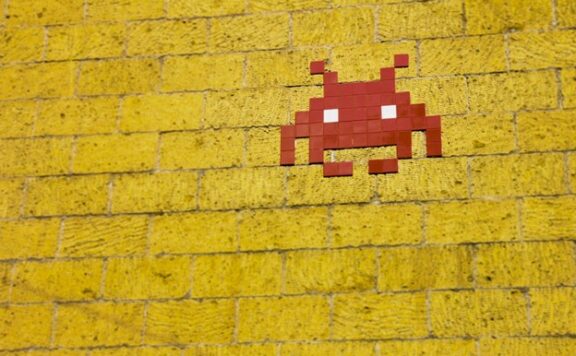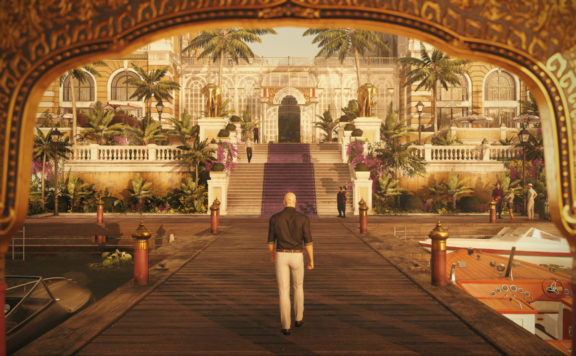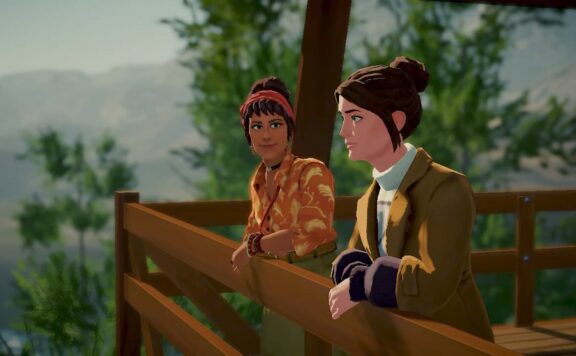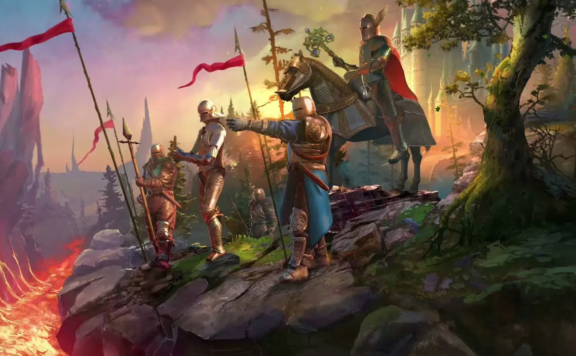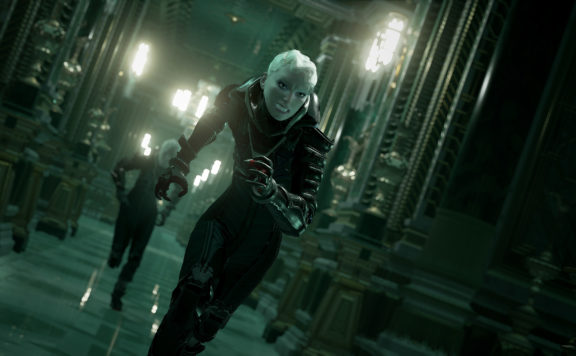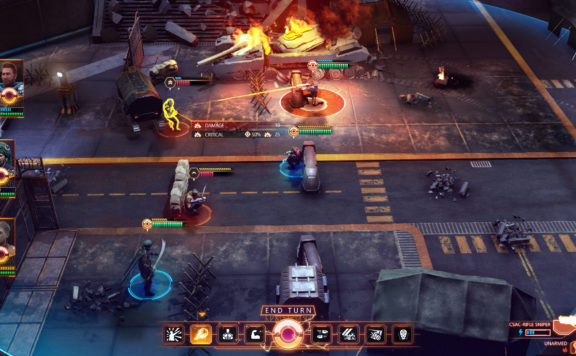This week, I sat down with Gareth Damian Martin to learn more about his journey to create the narrative indie masterpiece, In Other Waters. Being the sole developer naturally had its own set of challenges, and he graciously obliged to answer a few e-mail interview questions about his work.
Gamespace: Why did you decide to tackle the development of In Other Waters on your own?
Gareth Damian Martin: I am coming to game development from a fairly strange route – while I’ve been writing about games for a while and did work as a tester a decade ago, I have spent most of my time work in theatre, graphic design and motion design, as well as studying literature.
In these fields, I am very used to having my own artistic practice and so when it came to thinking about making games, I just naturally decided that I would like to work as the primary author of the game. I’m a fairly multi-skilled person, and very used to working with myself, so while it did involve a lot of learning, I find that to be one of the most exciting and pleasing parts of working on a game (mostly) by myself.
Gamespace: How much of the technical game development skills we see at display in In Other Waters were self-taught so that you could tell the world’s story effectively?
GDM: I am completely self-taught when it comes to Unity and the other software used for IOW, although it feels a bit strange to say that in a time when help is always a forum post or google search away! I also find teaching yourself software is pretty typical of my generation, especially if, like me, you studied something like theatre at university.
I also worked with a programmer, Chris Payne, on the game, to help build tools for me to enable me to work and for porting and very technical things like serialization/save data. Chris is a very experienced programmer who worked with traveler’s Tales for many years, so he was a huge help when I hit the limit of my own experience gap in making games.
Gamespace: Why did you decide to guide the narrative through the eyes of an AI’s UI instead of from Ellery’s POV?
GDM: The initial idea for IOW was to explore how I could use text and UI alone to create a living world for the player to explore. With this in mind, the idea of playing as an AI, inside the suit of a diver, quickly came to mind as a way of framing this experience. I was influenced by games like Duskers and Capsule, where the player is encouraged to interpret signals, and act as an operator within the game, rather than the puppeteer of a proxy character.

Gamespace: Could you talk a little bit about your work with procedural poetry, what it is, and how (if at all) you implemented it in In Other Waters?
GDM: My work with procedural poetry doesn’t necessarily appear in IOW but the influence is definitely there. My PhD in particular was about how procedural poetry, despite not having traditional plot and character, could be thought of as a kind of narrative structure. This is because as humans, we interpret everything as narrative, its our way of sorting through events and information in our lives.
This reader-centric view is one I took in IOW, when presenting the player with information, knowing I could leave gaps that they would fill in themselves. The whole of IOW is built around these gaps (between the description of a creature, a drawing of it, and a little dot moving on screen for example) and they are what creates the immersive experience of playing the game.
Gamespace: How long has the narrative idea for In Other Waters been floating around in your mind, and what prompted you to finally act on developing it into a game?
GDM: The narrative core of IOW came together quite quickly during a holiday in Greece in 2017. I spent a lot of time that Summer swimming in the ocean and thinking about games and climate change, and as I did this idea of playing as an AI within a diver’s suit suddenly started to form in my mind. It felt like one of those rare ideas that was just too good not to make, so on returning to London I picked up Unity (which I’d only messed around with before) and tried to make a prototype.
Playmaker, a visual scripting tool, was invaluable for this as I am not really a programmer, and when I realized I could actually make games by myself, despite not being able to work directly with code, the possibilities suddenly became clear! I showed the prototype to some friends, including Greg and Dan at Shedworks (who are making Sable) and the reception was good enough for me to think about running a Kickstarter!
Gamespace: How has In Other Waters changed and developed from its initial vision?
GDM: The KS demo of IOW was very much a prototype, and I mostly can’t stand to look at it now! Not long after the KS finished, I got an offer from Fellow Traveller to sign the game with them, and the extra funding transformed the game totally. The KS version of the game would have been smaller and much more limited, but the current version is bigger than even I expected, and better looking too. This was a long process of iteration, which took place over the last two years, and I think those two years have allowed me to really chase the promise IOW offered at the beginning and actually realize it in full.
Gamespace: Is there a specific description for an organism in the game that holds a special place in your heart? One that you’re really proud of?
GDM: I don’t want to give anything away, so I won’t talk specifics, but all the creatures in IOW have different qualities and associations for me. I am most proud of their depth and detail, and how they draw on real biological concepts. Many of them took a lot of in-depth research and speculative thinking around discoveries currently being made on our planet.
The reef stalks for example, are extrapolated from the fungal colonies that network our own forests with webs of communication and carbon-transfer. For me, embedding the creatures in real science and biology was vitally important for making this a world worth studying, not just a landscape of “alien” coral reefs and “alien” fish that does nothing but present a palette swapped view of earth.
The soundtrack for In Other Waters is breathtaking and perfectly fits our mission of exploring a foreign, alien landscape.

Gamespace: Were you also responsible for creating the music for In Other Waters, and can we expect to see a soundtrack of the music available at some point?
GDM: Amos Roddy is the composer and sound designer responsible for the sounds of IOW. I really love the work he did to get players into the right state of mind, and also to bring the UI and interface to life. He will be releasing the OST alongside the game, so look out for that, it is a wonderful piece of work in its own right, and I hope it gets recognized for that.
Gamespace: What was your ultimate goal for the story and final lesson of In Other Waters? What do you hope your audience walks away with?
GDM: I don’t think of the game as providing a lesson as such, but I would like people to walk away and think more about how we relate to our environment, and the things we are inflicting upon it, and perhaps consider their role in changing that. I’d also like people to feel curious about own marine life, not just the obvious and spectacular creatures such as whales and dolphins, but the small wonders of even common creatures.
There are so many creatures in our oceans that redefine our ideas about life, sentience, language and thought, it only takes a little curiosity to find out about them. I think if people knew what we were losing they would work harder to protect it.
Gamespace: Congratulations on the success of In Other Waters so far! Do you have any plans in the future of creating a successor or another game separate from the In Other Waters universe?
GDM: Thank you! I think my next game will be in its own universe, though there may be connections to ideas in IOW that turn up. It can be hard to survive as an indie in the current volatile market, so my only hope is to continue to make distinctive and challenging games that sit a little outside of genre territories. I hope this is the first of many games to come from Jump Over the Age.
Keep a lookout for our In Other Waters preview coming up! In it, we’ll have some gameplay footage to show off of your AI’s UI and how you use it to navigate the xenobiologist Ellery through an ancient, alien world to find her companion.


